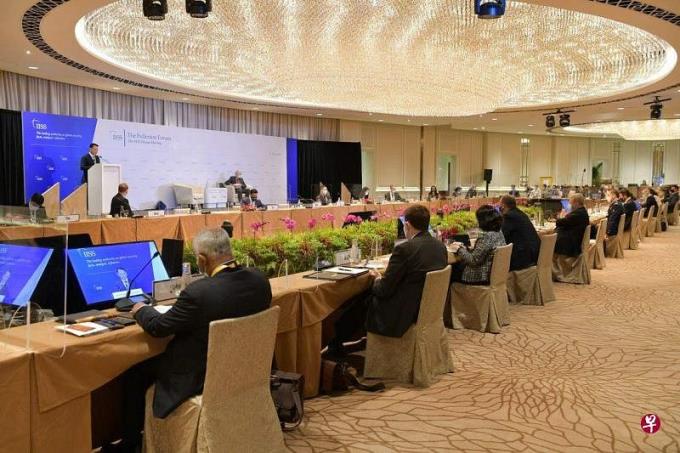
This session of Shangri -La dialogue, the United States and China have no dialogue, only right.China rejected the United States in advance to ask the two countries to meet during the dialogue meeting.It is generally believed that this is mainly because Washington refuses to lift the sanctions against China Defense Director Li Shangfu.In fact, the problem is far more complicated than this.In general, the layout of the United States over the past few years has changed the military situation in the entire Asia -Pacific region, forming a encirclement in China.Of course, the most critical is Taiwan. This is the most popular bottom line in China, and it is impossible to surpass.
For China, it is important to maintain the communication channels of the two armies to avoid any gunfire.But the two countries' dialogue at this moment does not seem to have any substantial significance.When the United States has completed the surround deployment, the dialogue cannot change the status quo.The ultimate intention of the United States has now been seen in poor dagger, that is, Austin reiterated at the incense lecture: the United States is committed to maintaining the status quo of the Taiwan Strait and opposing any party to unilaterally changing the status quo.
Simply put, this is the ultimate strategic goal of the United States in the Taiwan Strait.The so -called status quo is one middle school, and the so -called maintenance status quo has no timetable.For China, maintaining the status quo cannot be unified, which is unacceptable; the unity of unity in the endless period is far away.This is also unacceptable to Beijing.
Austin said that the responsibility of the United States is to gather strong deterrence to prevent conflicts in the Taiwan Strait, which means to deceive Beijing to move against Taiwan.He also vowed to support American allies and partners to deal with coercion and bullying, and his spearheads were pointing to China.The so -called assembly of strong deterrence to prevent conflicts in the Taiwan Strait means that it is necessary to observe China's force to attack Taiwan or promote martial arts.At the same time, it is to strengthen Taiwan's internal maintenance.The longer the status quo is maintained, the stronger the local consciousness of the Taiwanese will become stronger, the more conducive to opposition to unity.
In other words, against martial arts, the United States does not want to see unity, even if it is peaceful and unified, because it does not meet its maritime interests in this area.On June 4th, there was a report from Nirmal Ghosh, a correspondent in the United States, introduced two new books.(Ryan Hass), Richard Bush, and Bonnie Glaser's cooperation about Taiwan.The former provides a new perspective on China, and the latter proposes that the United States should have more detailed and comprehensive handling techniques for the United States.The reporter said that this was a cool breeze for the current anti -Chinese emotions of Washington.To put it simply, these two new books are discussed mainly in the lack of understanding of mainland China and Taiwan.
The reporter quoted a interesting suggestion of Ge Laiyi, Director of the Asian Program of the Washington Program of the Washington, Germany.She believes that the Biden government should guarantee to the Chinese side that if Beijing and Taipei can accept the agreement that both parties can accept through negotiations, the United States will not stop the implementation of the agreement.This is what the US government often said in the past. "As long as it is peaceful, we will agree, but we will not say this now."
Is this confirming that the above is the above?It is the strategic means of maintaining the status quo and not talking on both sides of the strait.In addition to the newly -blocking and strengthening aggressive forces in the actual practice, it is to encourage the DPP government's current policies: maintain the status quo and refuse to unify.The two cooperate with each other.Therefore, the United States understands that the United States is "emptying a Chinese principle" is correct.
In response to Austin's speech, Jing Jianfeng, deputy chief of staff of the Ministry of Staff of the Central Military Commission of the Mainland Government, immediately held a hair dryer at the incense venue to refute.He accused the United States of calling on communication and harming the interests of the Chinese side while claiming to strengthen the control of crisis and provocation, and there was no such reason in the world.He called on the United States to respect China's core interests and major concerns, and remove obstacles for the two armies with actual actions.
Jing Jianfeng shows that the PLA "full time to fight and can fight at any time" and resolutely defend national sovereignty and territorial integrity.He also criticized the United States to continue to blur and empty the principle of China, strengthen the official exchanges with Taiwan, condone the split activities of Taiwan independence, improve the number and performance of the weapons sales of Taiwan, and attract other countries to intervene in Taiwan.
The next day, when it was Li Shangfu's speech, it was clearly stated that the issue of Taiwan is the internal affairs of China. This premise cannot be questioned. The solution to the Taiwan problem is the Chinese people's own affairs.But the fact is that the United States has interfered, and it has also set up a "red line" that cannot be crossed on both sides of the strait.
On the issue of Taiwan, the United States has clearly stated that Taiwan is part of China. Why is there such a tough new position now?Without him, it was easy to move.First of all, China has now been characterized as the number one opponent in the United States, threatening the status of the world's world overlord; second, China has a stronger military force.Once the two sides of the strait are unified, the US forces in the Asia -Pacific have to retreat.
On the same day of Austin's speech, the U.S. Navy Seventh Fleet announced that the US missile destroyer and the Canadian Navy frigates rocked through the Taiwan Strait on the same day, saying that it was a place where the Gonghai navigation and flying over the freedom of freedom.Cooperating with the defense's remarks strongly, it is full of provocation.We might as well imagine that if the two sides of the strait are unified, will American ships still have such "freedom"?There must be no, because the Taiwan Strait is already the inner sea of China.
Therefore, the United States has not only tied up from the blur in the past, but also tied Japan, South Korea and Australia to a chariot, so Japan said that there is something in Taiwan in Japan.
Regarding the issue of Taiwan, former Singapore Minister Yang Rongwen quoted the two lines of metaphors made by Founding State Prime Minister Lee Kuan Yao in the second series (English version) in his new book, and explained the three attitudes towards unification.Of course, China hopes that the better the two lines, the better, that is, the unity of both sides of the strait; Singapore will feel that it will be better than that in the United States and Japan because of considering the military training facilities in Taiwan;EssenceJudging from the current situation, the attitude of the United States has changed. It is hoped that the two lines will never be closed. This should be a subtext that maintains the status quo.
Do China and the United States be in the end?This may not be.As long as Taiwan dare not declare independence, Beijing will probably not have to do it.The so -called world affairs are new, and the current paranoia of McCarthy -style in the United States cannot last for a long time.After all, China is not the Soviet Union, not to mention that there are great commercial interests between China and the United States.However, the fighting between the two sides will inevitably produce spillover effects. One of them is to involve the entire Asia -Pacific region into the arms race.
Singapore Minister of Defense Huang Yonghong mentioned this when he spoke on the last day.He pointed out that global defense expenditure reached a high of $ 2.2 trillion (about S $ 3 trillion, the same below).By 2030, national defense expenditures in the United States and China are expected to reach US $ 1 trillion and $ 500 billion respectively; Australia, Japan, and India reached 40 billion US dollars to US $ 180 billion; Asianiana's increased by 40 %, reaching US $ 130 billionEssence
In addition to letting the arms dealers get a lot of money, what are the benefits of the world and region?The Sino -US dialogue becomes a pair. We can only hope that the two sides can close their hands in time, accept new geopolitical reality, and reshape the stable and stable major power relationship.


